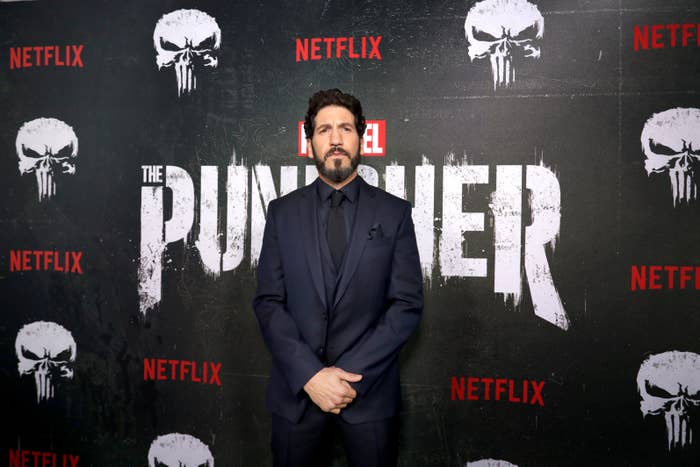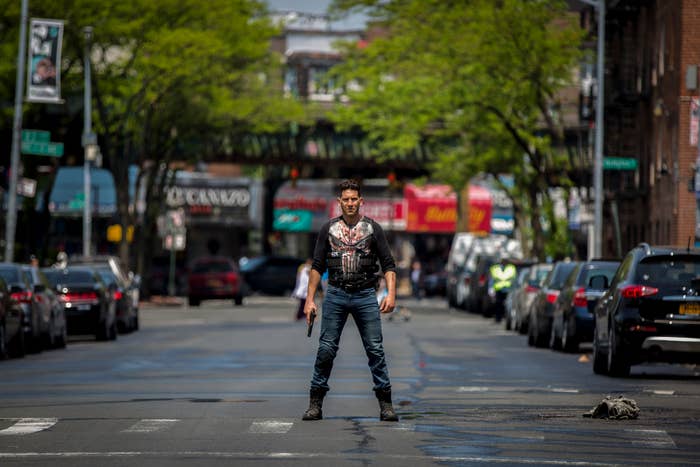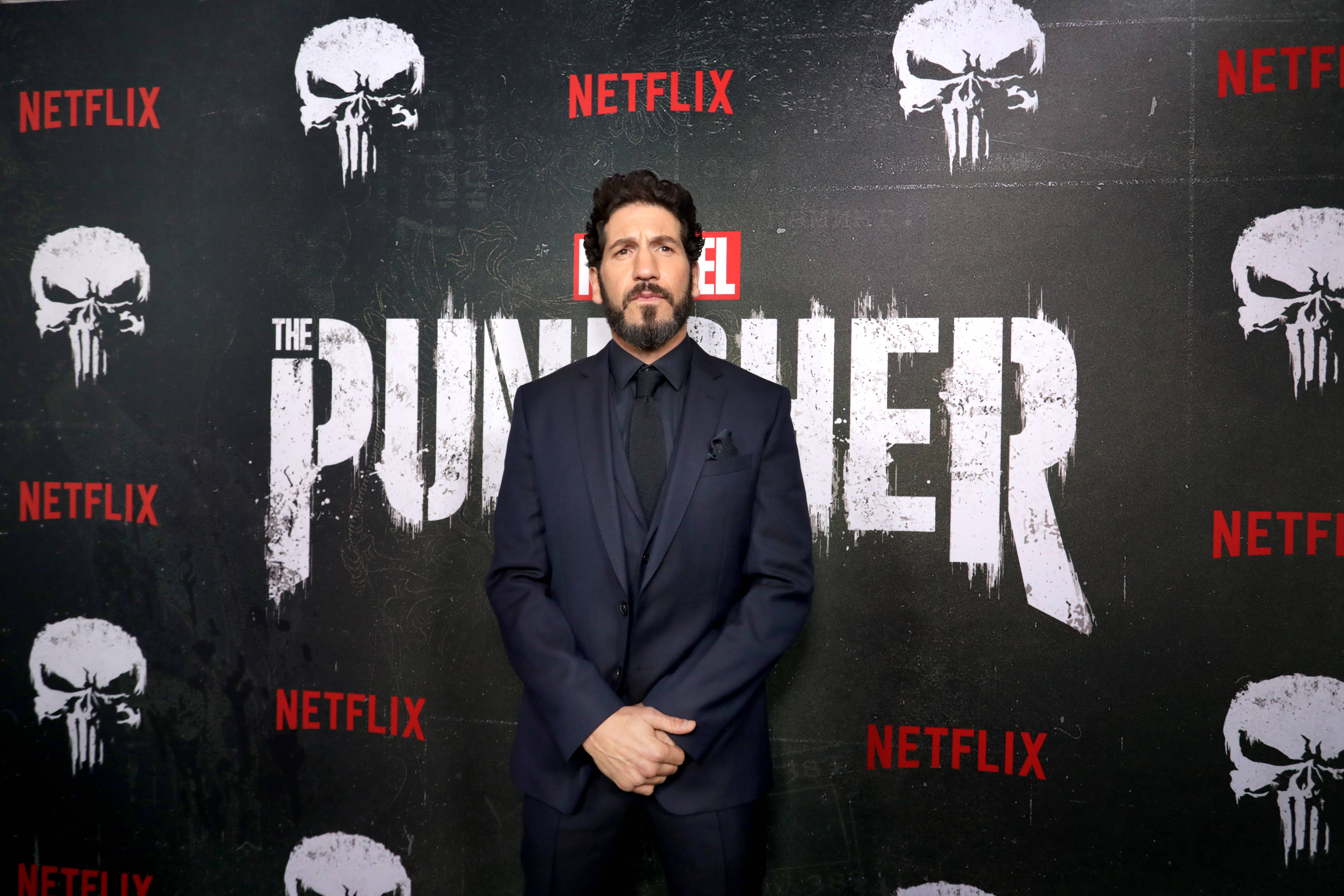
On first glance, Jon Bernthal couldn’t be more different from Frank Castle, the character he plays on Marvel’s The Punisher, whose second season drops on Netflix this Friday (January 18). Bernthal is affable, accessible, and tells me on multiple occasions how appreciative he is that I’ve taken the time to talk to him (the pleasure was all mine). Castle, on the other hand, is damaged, mournful, and oozes blind rage, particularly when he’s moonlighting as the savage vigilante they call the Punisher.
But a closer look at Bernthal’s past reveals more common threads between him and his most beloved character than meets the eye. Like Castle, Bernthal has a long history of violence, something he’s been surprisingly candid about in past interviews. Despite having grown up in an affluent part of Washington, DC, Bernthal had an attraction to the streets, which resulted in his fair share of run-ins with the law. Bernthal’s demons nearly caught up with him in 2009, when he was walking in his dog in Venice Beach, and a drunk homeless man started harassing him. When the situation escalated, Bernthal punched the man in the face and nearly killed him. “If that guy doesn’t wake up, you’re going away for life,” a police officer told him.
The man eventually did regain consciousness, and Bernthal was given a second chance, one that he’s parlayed into becoming one of the most in-demand actors in show business. After a star-making turn as the hero-turned-villain, Shane Walsh, in AMC’s The Walking Dead, Bernthal has established himself as Hollywood’s go-to tough guy, appearing in films like Wolf of Wall Street, Baby Driver, Sicario, Fury, and Shot Caller.
But it’s his role as the Punisher, which he unveiled in Season 2 of Daredevil, that’s unlocked Bernthal’s true potential as a leading man. In Season 2 of The Punisher, we find Castle drifting aimlessly across the country, fresh off of laying waste to the individuals responsible for murdering his wife and kids. That unrelenting need for vengeance has traditionally been the character’s entire raison d’etre. So what does the Punisher do when there’s no one left to, well, punish? For one, Castle seems to have accepted his role as a superhero by helping those who are helpless, particularly a mysterious young woman who’s being hunted by a group of highly-trained criminals. That, and the return of his arch-nemesis Billy Russo—who becomes the deformed supervillain Jigsaw in Season 2—means that there’s no shortage of bad guys destined to feel the wrath of the Punisher.
Below, our conversation with Bernthal on how he gets inside Castle’s head, what the role has taught him about the realities of PTSD, and the complexities of navigating the Hollywood landscape. Spoilers ahead.
What are some of the ways that Frank evolves in Season 2?
When you find Frank at the beginning of this season, he’s in a situation where he’s really attempting a life of peace and wandering and trying to stay out of the way. One of the things that influenced Steve (Lightfoot) a lot when he took over writing the show was a Sebastian Junger book called Tribe. It really speaks to the rise in suicides among vets that come home, and the unfortunate phenomenon of what happens to folks when they’re on a mission overseas fighting, living with a bunch of people and going through the same things as they, and then what the return home is like. All of a sudden you’re dealing with the quiet and pedestrian issues, and suddenly there’s nobody around that can relate. Ultimately what Frank looks for in peace, he doesn’t find, and when everything goes haywire he takes a swing at human connection with Beth and she ends up getting shot. He takes a personal responsibility for that, and it makes him go further into self-loathing.
What have you learned about the complexities of PTSD while playing Frank?
The one thing that I learned above all else is that no two people’s issues are the exact same. I’ve been absolutely blessed that the military community has opened up to me in a way that I’m endlessly and eternally grateful for. I’ve talked to so many soldiers that I truly believe are the best among us, that have shown so much sacrifice and resolve, not only in keeping our families and our country safe, but in the bravery it’s taken for them to open up to me and to really share their experiences and to go to places that they don’t want to revisit.
So you’ve spoken personally with veterans to help you get inside Frank’s head?
Absolutely, and I’m staggered by their generosity. It’s something I’ll always cherish. People have talked to me about certain triggers and experiences that set them off, and no two people’s experiences are the same. What happened with Frank is quite interesting because the trauma that sent him reeling, it happened at home, it didn’t happen overseas. Everything he does is in retaliation and relation to that event, and I think that what he is trying to do more than anything else is he’s trying to figure out a way to go forward. He’s trying to figure out a way to cope, and I think ultimately where he lands at the end of Season 2, is he needs to distance himself from anybody and everybody that he cares about because he’s a total shit magnet for everybody. He brings violence into everyone’s life. He realizes that he does actually have this skill-set, he does have this ability to be a cold blunt instrument and he can be useful to society by going and killing the people that need killing. It’s a lonely place that he comes to, it’s a sad place that he comes to, but it’s a quite selfless place that he comes to, and I feel like having some purpose is what will ultimately let him cope in the right way.
This season, Frank seems to take pleasure in violence more than he did in Season 1.
There’s a kernel of something that’s in the comic that I’ve always wanted to be in the show, and that is "Who is the real Frank Castle?" Is he the father that’s home in the suburbs with his wife and kids, or is he the soldier standing neck deep in blood and guts? Who is the real person and how much of this is self-manifesting and how much of this violence did he bring on to the people around him and how much is he a victim of it? I think the one thing that’s sure is that when he’s on a mission and when he has an enemy. I think it focuses him and he’s comfortable with that and he’s resigned to that sort of life. Unfortunately it’s the only life that he feels like he deserves.
You’ve said in the past that you tend to stay in character with the Punisher and go to a very dark place. Before filming starts, do you basically say goodbye to your friends and family and just kind of go under?
To a certain extent, but I don’t think it’s that dramatic. For me, what acting is a lot of the time is figuring out how to stay in proximity to the truth of the character for long durations of time when all you’re trying to do is capture a matter of seconds between action and cut. Sometimes you can stay really close, and sometimes you can let yourself get further away. Now that I’m three seasons in, he’s in my bones, so it’s not as difficult to get where I need to go. That being said, isolation, solitude, going to some pretty dark places, are all definitely part of my toolbox in playing Frank. I’m not looking to have a light, fun experience with him and I think to do that would be disingenuous to the character, to the vets and the members of the law enforcement community that this character means so much to. And ultimately, it wouldn’t be right to the fans of the comic. I really try and take it seriously.

Were you surprised to learn that Netflix was cancellingDaredevil, Luke Cage and Iron Fist?
It definitely surprised me. Especially with Daredevil, but I get it. I try to not concern myself with things that happen in rooms that I’m not invited into. I kid myself that I’m mentally healthy in this crazy industry, but one sort of code that I live my life by is I only put and focus [my] attention into the things that I can control, and not wasting my time or worrying about the things that I can’t. When I have a job and I have a character to play, I worry like hell and I put everything I have into making it as good as I possibly can. But to sit there and worry about things that I can control, I think it’s a big waste of time and in this business, it’ll drive you crazy.
Now that you’ve had a huge streak of success, do you finally feel like you belong in Hollywood, or do you still feel a bit of imposter syndrome when you’re on set?
I haven’t gotten rid of that one bit. Every job I start I'm like "What the hell am I doing here? I got no idea what I’m doing!" And honestly, I would be really worried if I didn’t feel that way. If I ever talk to you and say "I got this one figured out, I crushed it," and if we were in the same room, throw a phone at my head. I don’t want to be that guy. Often times, the best things about certain about jobs, and certain relationships, is that the best and worst things are very closely the same.
The hardest thing about this job is you never know, and the best thing about this job is you never know. It’s a mystery, and the fact that you can go to work everyday and not know if you’re going to fall right on your face and screw the entire thing up, those are the stakes I like to play in. I like that it matters, I like that it’s vital. I like that I could fail. It means you gotta work your ass off to not fail, and when you do fail you gotta come back harder the next time. I don't think I'll ever get this thing licked, and one of the things I love most about this is there’s always room to grow. You’re always learning and you could always take it so much further and I’m blessed to be given the opportunity to try and do that.

